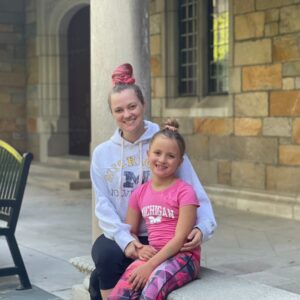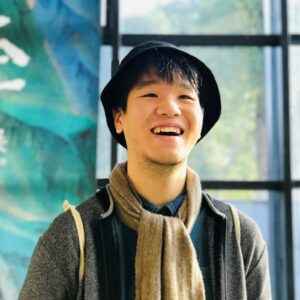Academic Year 2022-2023

Hi, I’m Sierra Buford, a Freshman in the College of LSA. I’m currently undeclared, but I plan on majoring in Neuroscience with a minor in Computer Science. I’m pursuing a Pre-Physician Assistant track, and I plan on getting my masters by attending PA school after I receive my bachelor’s degree. I’m from Cincinnati, Ohio which is about three and a half hours away from Ann Arbor! I’m working as a UROP student on the qualitative team of the project Broadening Participation in STEM. I was drawn to this project because I think it’s very important to have representation of minorities in STEM fields. Working on this project has given me the opportunity to study the challenges underrepresented minorities face in STEM, and come up with solutions for these students in order to promote minority participation in STEM!
Student caregivers and their educational trajectories: Understanding the influence of the social identity of students interested in STEM
African American, Latinx, Native American, and other racial minorities are and continue to be underrepresented in Science, Technology, Engineering, and Mathematics (STEM) disciplines. The National Science Foundation has implemented several initiatives, including the Louis Stokes Alliances for Minority Participation (LSAMP) to address this problem. Michigan LSAMP (MI-LSAMP) increases URMs’ graduation in STEM fields and subsequent participation in the STEM workforce. MI-LSAMP provides STEM educational supportive and adjunctive services to fuel underrepresented minority students’ (URMs) interest in STEM and their academic and professional success. The overall MI-LSAMP research program focuses on understanding how multilevel (e.g, individual, campus, program) strengths influence students’ STEM-related career plans and educational goals, especially as they relate to postsecondary degree attainment and advanced graduate or professional studies. As part of the research program, my study will use the Bowman Strength-Based Model (2011) to understand how social identity (more specifically, caregiver identity) operates as a personal strength. Student caregivers face challenges in attaining their career and educational outcomes due to their dual roles as parents and students (Moreau & Kerner, 2012) yet institutions may not be providing much support to accommodate their needs. Using a semi-structured interview protocol, a PhD researcher interviewed seven students who began participating in MI-LSAMP prior to fall 2022 . I plan to use responses to questions from the sections related to ‘Identity in STEM’, ‘Sense of Belonging and Intent to Persist In STEM’, and ‘Academic Challenges In STEM’. In this poster, I report on a preliminary phase of the study “memoing and code development. I memo’ed the interview transcripts for two purposes: to develop definitions of student outcomes and to identify factors outside of the Bowman strengths-based model that I think are important to understanding caregiver identities. I identified two career outcomes (explicit commitment to earning a degree as a STEM major and to pursuit of a graduate degree) and three educational outcomes (transfer to a different institution, degree plans, and declaration of a major). My findings will be discussed in terms of my next research steps and their implication for educational practice or policy.

Melanie Castañeda is a Research Assistant in the Diversity Research and Policy Program (DRPP). She was born and raised in Arizona and became an undergraduate student in the College of Literature, Science, and the Arts at the University of Michigan, Ann Arbor. She is planning to pursue a dual degree in Neuroscience and Chemical Engineering. Her goal is to attend graduate school with a focus on neural engineering at the end of her undergraduate career. Her goal is to use her experience from the DRPP and university to explore the brain at the research level to make a positive impact globally.
Application of the Bowman Strengths-Based Model to DEI Interventions: Investigating peer mentoring as a program-level strength
In higher education, some racial minorities such as African Americans, Latinxs, American Indians, and Native Hawaiians/Pacific Islanders are underrepresented in academia, particularly in STEM majors (NCSES, 2023). The National Science Foundation implemented the Louis Stokes Alliances for Minority Participation (LSAMP) as one initiative to address this issue. The Michigan LSAMP (MI-LSAMP) seeks to mitigate this discrepancy by providing students with supports such as tutoring, career exploration activities, and peer mentoring. Guided by the Bowman Strengths-Based Model (2011), the overall MI-LSAMP research program bestows insights into the multilevel strengths (i.e., personal, program, campus) that can clear the way for underrepresented students’ success in college. From one point of view, peer mentoring can be viewed as a program-level strength as previous research (e.g. Reio 2013) suggests that peer mentoring facilitates positive outcomes for mentees. Using a subset of questions in baseline surveys administered to the 2022-2023 cohort of the MI-LSAMP participants, I conducted t-test and chi-square tests to examine baseline gender differences in students’ experiences and perceptions of peer mentoring. T-tests revealed that, compared to males, females discussed more topics with their peer mentors. In addition, females engaged in discussion of some topics more frequently than males. Interestingly, both genders infrequently discussed family support with their mentors. The findings will be discussed in terms of the limitations of the study, the implications for educational practice or policy, and my future research plans.

My name is Joel Ferick, and I am currently a Sophomore at Henry Ford College, who has recently committed to transfer into University of Detroit Mercy’s architecture program for the next academic year. My involvement within the DRPP this smester entailed working with survey data in order to discover if there is any connection between physical space and underrepresented student sense of belonging within STEM majors.
The impact of campus physical space on sense of belonging among underrepresented STEM students
In the U.S., underrepresented students (URS) have disproportionately experienced alienating college atmospheres (Johnson et al., 2020). This problem has become increasingly prevalent within STEM majors specifically. The root of this issue stems from collective neglect on behalf of college campuses and administration teams to accommodate for the cultural, societal, physical, and mental differences and challenges URS possess in contrast to the majority neurotypical and white student body (Johnson et al., 2020). This neglect has culminated in intense feelings of alienation on campus, ultimately resulting in challenges regarding underrepresented student retention. Therefore it is important to understand factors that encourage URS sense of belonging on campus. Most research (e.g., Johnson et al., 2020; Carter et al., 2017) conducted on sense of belonging primarily emphasizes how a campus’s social aspects (e.g., communal) impact sense of belonging, leaving notably the influence of physical space comparatively understudied. My study contributes preliminary findings that connect elements of physical space to students’ sense of belonging, I describe findings from three underrepresented college student survey respondents. All students are participating in MI-LSAMP, an NSF funded alliance of six Michigan higher education institutions students working to broaden marginalized students’ participation in STEM disciplines. Students responded to various survey questions related to place attachment while considering the place on campus where they feel the greatest sense of belonging. While each student exhibited a strong personal, emotional, and practical connection to their chosen location, participants also cited poor communal connections, underemphasizing the social practicality of the desired space.

I am Weicheng Hong, and I come from Quanzhou, China, which is a city listed by UNESCO as “Emporium of the World in Song-Yuan China” in The World Heritage List. I am currently a junior student majoring in Statistics and Data Science, I am very interested in data analysis, and I hope to continue studying data analysis in my graduate school. I am currently part of the quantitative team in the project Broadening Participation in STEM as a UROP student. Because of my personal experience as a first-generation college student in UMich, I clearly feel that I have significant differences with continuing-generation college students, and I faced some academic challenges partially due to a lack of academic support from my parents who did not attend college. Therefore, I believe that studying the underrepresentation of first-generation college students is paramount to achieving inclusion. In the project, my topic is “Confidence in Attaining Short-term and Long-term Goals: Differences between First and Continuing-Generation College Students”.
Confidence in Attaining Short-term and Long-term Goals: Differences between First and Continuing-Generation College Students
Talented African American, Hispanic, and American Indian undergraduates remain underrepresented in the STEM workforce and graduate studies (Bowman 2011; 2013). The National Science Foundation has implemented several initiatives to tackle this problem, including the Louis Stokes Alliances for Minority Participation (LSAMP). The Michigan LSAMP (MI-LSAMP) strives to increase the number of underrepresented students who earn or transfer into STEM baccalaureate degrees and enroll in STEM graduate programs. The overall MI-LSAMP program of research uses the Bowman Strengths-based Role Strain Adaptation model (2011) to investigate multilevel factors that promote students’ academic and career success. As part of this research program, my study focuses on first-generation college students. Even though the number of these students attending U.S. universities and colleges has increased, they face many challenges in academia partially due to limited academic support from parents who did not attend college (Stephens et al., 2012). Therefore, studying the underrepresentation of first-generation college students is paramount to achieving inclusion. I analyzed baseline survey data from 2022- 2023 MI-LSAMP participants to examine confidence in pursuing goals as an individual-level strength. I conducted t-tests to examine possible differences between first-generation and continuing-generation college students’ confidence in attaining short-term and long-term education and career goals. No statistically significant differences were found between first generation and continuing-generation college students’ confidence in achieving short-term goals. However, the first-generation college students were more confident than continuing-generation college students in pursuing a career related to STEM education or communication. Findings will be discussed regarding implications for educational practice or policy and my future research plans.

I’m Olivia Lee, a UM School of Public Health student working on obtaining my BS degree in Public Health Sciences! I’ve lived in rural Mid-Michigan my whole life and love being outdoors. Most days, you can find me running, biking, hiking, and in the winter months, skiing! I come from a small town where STEM and related topics weren’t emphasized in school, so I am passionate about encouraging young people to learn more about STEM and develop a love for education. After my time as an undergraduate, I hope to pursue an MPH or a Public Health career related to childhood health education and nutrition.
Applying the Bowman Strengths-Based Adaptation Model to STEM students: Identification with socioeconomic status as a personal strength
Historically, some racial minority groups continue to be underrepresented in STEM fields in higher education (Riegle-Crumb et al., 2019). Several initiatives address underrepresentation in STEM, including NSF’s Louis Stokes Alliances for Minority Participation (LSAMP). Retention and participation of minority students in STEM fields at various Michigan higher education institutions are a part of Michigan-LSAMP’s (MI-LSAMP) purpose. Based on the Bowman (2011) Strengths-Based Model, the overall purpose of the MI-LSAMP research program is to understand multilevel (e.g., personal-level, campus-level, program-level) strengths that can help underrepresented students succeed in college. As part of the research program, my study focuses on social identity as a type of personal strength. I focus on students’ sense of belonging as it relates to their identification with their socioeconomic status (SES) because SES can be a significant factor in determining how a student experiences higher education (Titus, 2006). A Ph.D. level researcher used a semi-structured interview protocol to obtain qualitative data from seven MI-LSAMP students who began their participation prior to fall 2022. Students were asked about challenges they’ve faced, their sense of belonging on campus, and their aspirations to continue in their studies. In this poster, I present a preliminary step in the process of analyzing the interview data that will be used later to examine how social identity is related to student sense of belonging. In this phase of my study, I memo’ed the interview transcripts in order to: a) develop definitions of student outcomes as represented in the Bowman model and b) identify factors outside of Bowman’s Strengths-Based Model that I think need to be considered prior to the coding phase of the study. These factors include a student’s sense of belonging while on campus, a category not addressed in the Bowman Model. My findings (the codes developed) will discuss be discussed in terms of how a student’s sense of belonging might be impacted by their socioeconomic status and the implications for educational practice or policy. In the next phase of my research, these codes and codes developed from the Bowman model will be applied to the interview transcripts.

My name is Claire Oczon, and I’m from Albuquerque, New Mexico. Currently, I’m a freshman in the College of LSA. Although I haven’t picked a major yet, I want to pursue some sort of STEM degree. After my time as an undergraduate, I hope to be in the medical field. As a UROP student I’m working on the Heart Truth project where I am contributing to a literature review on health education, more specifically for Filipino Americans. I was drawn to this project because I thought it was important for my culture to have equal representation in healthcare.

Hello! My name is Natalie Rue and I’m currently a freshman at LSA. Some of my interests include basketball, dancing and drawing. I love listening to music and meeting new people.

Hi my name is Cindy Tan. I am currently a sophomore majoring in UX design. I grew up in Troy, Michigan, which is about an hour drive away from Ann Arbor. I am currently a mentee in the project Broadening Participation in STEM as a UROP student. As a first-generation student at UM, I am aware of the disparity of opportunities for minority students when it comes to being in a STEM major, and would like to conduct qualitative research to understand how we can broaden participation in STEM for underrepresented students. Aside from UROP, I am also a part of the Vietnamese Student Association and Michigan Open UX.
Preliminary steps in understanding the individual strengths of students with mental health or disability challenges
Underrepresentation of some racial minority groups continues in higher education with the different levels of accessibility. Studies (e.g., Barbuti, 2010; Woo, 2019) have shown that underrepresentation perpetuates systemic biases, limits the diversity of perspectives, and discourages future generations from pursuing postsecondary education. Initiatives like the National Science Foundation’s Louis Stokes Alliances for Minority Participation (LSAMP) support the STEM education pathway, providing direct support to undergraduate students through strategies such as mentoring, successful learning practices, and the use of technology. My study is part of the overall MI-LSAMP research program, which uses the Bowman (2011) Strengths-based Model to understand how multilevel (e.g., individual, program, and campus) strengths independently and in combination with program activities affect the educational and career success of students interested in STEM. As part of this research program I am examining the individual level strengths of students who identify as ‘differently abled’ and those who face mental health concerns. It is essential to study the strengths of these students to inform interventions to promote equitable access to educational and career opportunities. It is also important to study URMs who deal with mental health concerns, since some studies (e.g., Kalkbrenner, 2023) suggest that STEM students are more susceptible to mental health issues compared to their non-STEM counterparts. My study uses interview data obtained from seven MI-LSAMP students from the 2020-2022 cohorts. A Ph.D. research used a semi-structured interview protocol containing various questions focusing on academic challenges in STEM, strategies for managing challenges, personal strengths, and social identity. In this paper, I present preliminary steps before analyzing the interview transcripts. After the transcripts were checked for accuracy, I memo’ed the transcripts to define the student outcomes and to identify factors outside of the Bowman Model that I believe are important to consider. This study presents a preliminary step to understanding how social identity can enhance the physical and emotional well-being of underrepresented students in STEM. I discuss findings in terms of the next research phase and their implications for educational practice or policy.
Academic Year 2021-2022

Denise Fajardo is a UROP Research Scholar for the Diversity Research and Policy Program. She was born in the Philippines then came to America in 2007 and moved to Michigan in 2009. She has been enjoying hobbies such as dancing, visiting museums or attractions, watching movies, and cooking. When she was a senior in high school, she took AP Psychology, which sparked her interest and passion in getting to know how society works and how people think. As a sophomore now in the University of Michigan, she is majoring in BCN (Biopsychology, Cognition, and Neuroscience), and she hopes to continue learning about people and the way society works even well after her undergraduate career.
The Effects of Racial and Ethnic Socialization and Extended Family Support
Existing literature has demonstrated that family members influence students’ education and career plans. For example, perceived parental support has been shown to impact career decisions among undergraduate Asian Americans; students tend to choose careers they feel their parents would approve of (Hui & Lent, 2018). However, the definition of family can be broadened beyond one’s parents to include other relatives. Thus, it is important to understand how extended family (i.e., family beyond parents and siblings that includes grandparents and other relatives) support as a whole may influence career plans (Meriam-Webster, 2018). In addition, another way family influences career development is how they shape one’s system of values and attitudes, and this differs across racial and ethnic groups. Thus, it is important to see how career plans are affected by racial/ethnic socialization (RES)—how explicit and implicit messages (e.g., dealing with racism, racial pride, or the meaning of race or racial/cultural identity) are taught to children (American Psychological Association, 2018). Since it is known that Asian Americans tend to place greater emphasis on achieving STEM careers, I decided to focus on STEM majors in my analysis, specifically biomedical/behavioral science majors versus other basic/applied science majors. My analysis served to answer the following research questions: What is the relationship between RES and education/career plans? What is the relationship between extended family support and education/career plans? Do students in the biomedical/behavioral sciences vs those in other basic or applied sciences differ in terms of RES and extended family support? I conducted a secondary analysis of survey data from non-white undergraduate student applicants to the Big Ten Academic Alliance Summer Research Opportunities Program (BTAA-SROP). My sample focused on biomedical/behavioral science majors and other basic/applied science majors. In my sample, 78.9% were African American, 16.7% were Asian American, 3.4% were American Indian or Alaskan Native, and 1.1% were Native Hawaiian or other Pacific Islander. My analysis used data from two time points: the summer of 2011 (Time 1 – beginning of the program) and the summer of 2012 (Time 2 – a year later). The demographic variables (race and major) were collected at Time 1 as well as the predictors (RES and extended family support). The outcome variables (interest in PhD career or research career) were measured at Time 2. My first set of analyses examines if RES and extended family support, are related to education and career plans. Contrary to my expectations, significant negative correlations between the entire extended family support and the bloodkin family (grandparents, aunt/uncle, cousins) support subscale and pursuing a PhD were found only for biomedical/behavioral science students. The analyses suggest that the more a student believes their entire extended family or bloodkin family supports their pursuit in a PhD, the less certain they will be to actually pursue one. In addition, RES does not seem to affect education and career plans.There were no significant correlations between RES and education and career plans. The second set of analyses examines possible differences in the predictor and outcome variables by students’ major. These t-tests revealed that there were no statistically significant differences between biomedical/behavioral science majors and other basic/applied science majors in terms of RES, extended family support, and PhD plans. However, other basic/applied science majors were more interested in pursuing STEM-related research careers than biomedical/behavioral science majors. My findings indicate that in this sample of students, extended family support but not racial ethnic socialization, plays a role in impacting students’ career decisions. Future research can seek ways to change how students designate the importance of different criteria in selecting careers so that they feel less pressure to pursue something they truly want to pursue. In terms of limitations, there was a lack of diversity among the minority sample I studied. Since cultural norms differ between each minority group, perhaps future research should focus on each racial group individually to assess the effects of RES and extended family support on education and career plans. In addition, perhaps it is too specific to ask students about their interest in pursuing a postbaccalaureate degree in their respective undergraduate major. Thus, future research can ask students of their interest in other careers besides a PhD or a research career such as a career in medicine, law, public health, etc.

Ziyu Guo is a sophomore student majoring in Statistics and plans to integrate his statistical background into the financial or consulting field. Besides, Ziyu is interested in the “chemical reaction” of arts with STEM education, which is why he decided to do this research. Speaking of his extracurriculars, Ziyu had two internships during the past two summers, which are related to finance. In the future, he hopes to participate in the quantitative field by modeling and bringing out constructive suggestions. To be more specific, Ziyu hopes to bring out an economically meaningful solution to improve education in his country, which can build up a positive cycle that draws more investment and popularizes STEAM education among all the cities.
A Literature Review of The Dimensions of Arts Integration with STEM in Classroom Settings
This paper reviews the impact of integration of the arts with STEM curricula. It discusses the corresponding influence of each category of arts with the STEM disciplines on K-12 and postsecondary students. I focus on the differences between various types of the arts and how these types of arts affect students’ academic and cognitive performance. To examine possible patterns of outcomes for different arts, I focus on the connections between academic or cognitive outcomes and art integration. Each integration between a type of art and STEM curricula leads to different and personalized development of characteristics, such as creativity, problem-solving, self-actualization, and self-confidence. The findings across studies are discussed in relation to their implications for program and educational practice.

Ella Lacy is an undergraduate research assistant on the Diversity Research and Policy Program (DRPP) team. She grew up in Westchester, NY and moved to Connecticut before coming to Ann Arbor to begin her studies. She is a sophomore at the University of Michigan studying psychology with an intended minor in business. On campus, she is involved with the Undergraduate Psychology Society and Best Buddies and is the acting president of her sorority. After graduation, Ella hopes to pursue a doctorate in clinical psychology and practice with children and families.
Factors Leading to Self-efficacy in STEM Students: A Focused Literature Review
Social cognitive career theory was developed to explain how educational and career choices are made and is frequently used in studies of students’ career-related outcomes (Lent et al., 2018). This theory states that self-efficacy beliefs and outcome expectations are related to students’ academic interests, career choices, career success, and more (Lent et al., 2018). Self-efficacy is defined as the belief in one’s abilities to perform specific activities or behaviors (Sheu et al., 2018). While many studies examine the relationship between self-efficacy and student outcomes, less attention has been given to the factors that lead to self-efficacy (i.e., mastery experience, vicarious learning, verbal persuasion, and affective state). A recent review by Sheu et al. (2018) found that self-efficacy is predictive of future academic and career success. The review briefly mentions the four precursors to self-efficacy but largely focuses on the applications of self-efficacy. My review dives deeper into these predictive factors and discusses how self-efficacy builds in STEM students, in particular, with this question in mind: what factors lead to self-efficacy in STEM students? I conducted a focused literature review by compiling recently published articles in five databases. I used the following search terms: “STEM or science or technology or engineering or mathematics”, “college students or university students or undergraduates”, “social-cognitivecareer-theory or SCCT” to identify articles. My search was limited to peer reviewed articles published in English, after 2017. I also excluded dissertations. I narrowed my findings to 21 articles and used the following guiding question to determine relevance: Does this article address the factors that lead to self-efficacy itself or how self-efficacy is applied? All four hypothesized precursors – mastery experience, verbal persuasion, vicarious learning, and affective state – have an overwhelmingly positive relationship with the development of self-efficacy. While all precursors play a role, mastery experience and verbal persuasion may be more effective in increasing self-efficacy, as they were more frequently mentioned throughout the literature. The findings will be discussed in terms of their implications for practitioners (student advisors, career counselors) who work with STEM students as well as their relevance to social-cognitive career theory.

Jessica Pelton is not a traditional student, she began her undergraduate career four years after having her daughter and being a stay at home mom. She was entering college as a student parent, first generation student, older student, and student with a learning disability but has thrived in her educational journey. She is now a senior in the college of LS&A pursuing her degree in Honors Psychology. She is currently doing an honors thesis about the educational experience of children with learning disabilities during the pandemic, works part time at CEW+ as the student parent program assistant, and is the president of MCaSP. She has spent the last year advocating for student parents on campus, working on research for student parents, and improving the resources and knowledge of student parents across campus. She hopes to continue this work and research after graduation and eventually hopes to see changes made nationwide for student parents. She plans to continue her education with a Master’s and PhD in Psychology with hopes to continue her student parent research and/or research for children with disabilities. Ultimately she would like to create an official student parent coordinator role on campus to continue supporting student parents long term.
Student parents & caregivers in selective higher education institutions
The levels of psychological distress amongst college students are high, especially among entering students who are going through several transitions (e.g., Laidlaw, McLellan, & Ozakinci, 2016). Students may experience challenges related to academic achievement, family obligations, and financial strains. Out of the 21 million students attending college in the United States, approximately 4.8 million of them are student parents. Among undergraduate student parents , a large number (roughly 1.3 million) do not graduate (Scharp, & Dorrance Hall, 2019). Regardless of their aspirations, student parents may lack resources that promote their success. Several factors may limit student parents’ access to, and use of, campus resources: time constraints, lack of childcare, unavailability of resources, lack of knowledge about specific resources, and insufficient support. These are all major factors in determining student parents’ overall success at universities. I explored resources and supports available to student parents and the limitations and restrictions regarding those resources and supports. I am presenting preliminary findings from the coding of focus group data obtained from undergraduate mothers attending a Research I university Focus group participants were volunteers identified through their previous responses to a needs assessment survey regarding policies, practices, and campus climate as they related to student parents. The group included four white mothers who had one to three children of various ages. A team of two coders including myself team were involved in the process of memo’ing the group transcript and creating an initial codebook. We have begun the process of checking intercoder reliability by coding two sections. The level of coding agreement was 54% for general experiences and 59% for resources. We generally agreed on the application of “difficulties & challenges” and “experience” as major codes for the material, and examples of excerpts are provided. While our team will further discuss the codes to improve reliability, the preliminary finding is that student parents are in need of additional resources.

Stuti Shankar was born and raised in Canton, MI. Currently, she is a junior at U of M on the pre-med track. Her major is Biopsychology, Cognition, and Neuroscience and her minor is sociology of health and medicine. She is really passionate about social justice and she is involved in the South Asian Awareness Network which holds an annual conference to promote conversation and knowledge about various important topics. She is also a research assistant at the CEW+. After graduation she hopes to attend medical school.
Academic Year 2020-2021

Pronouns: he/him/his
Lucas Campbell was a UROP Research Assistant with the Diversity Research and Policy Program (DRPP). He is a rising third-year undergraduate student in the College of Literature, Science, and the Arts at the University of Michigan, Ann Arbor. He is a first-generation college student from Belleville, a city in Southeast Michigan. As a UROP Research Assistant with DRPP, Lucas completed a paper on the benefits of mentoring in undergraduate research programs for first-generation college students. Lucas is currently pursuing a bachelor’s degree in psychology and aims to attend medical school to study psychiatry.
How do Undergraduate Research Programs Help First-Generation College Students?
The existing literature on first-generation college students (Ives and Castillo, 2020; Antonelli et al., 2020; Keefe et al., 2020) centers primarily on the unique obstacles they face on their path to success upon entering college. Though some authors (e.g., Almeida et al. 2019; Chang et al., 2020) have studied how first-generation students can overcome these barriers, few have mentioned how undergraduate research programs can be an effective method for doing so. Palmer et al. (2015) suggest that students can benefit greatly due to the many mentoring relationships involved in undergraduate research programs. To synthesize these studies and identify these benefits, I conducted a literature search of multiple databases (i.e., PsychInfo; ERIC) to identify articles related to first-generation college students’ participation in undergraduate research programs. In my review of the 31 articles I collected, I found that first-generation college students can utilize undergraduate research programs as a social capital intervention. This intervention allows first-generation college students to gain social capital, which refers to the benefits and resources (i.e., psychological and academic support, increased retention, field socialization, a communication network) received from a social support network (Parnes et al., 2020). These benefits and resources aid students in their college career and are obtained through interactions with faculty and peer mentors in the research setting. I discuss mentoring techniques to facilitate social growth and additional improvements to undergraduate research programs that can further benefit first-generation college students’ transition to higher education.

Nourin Chowdhury is a UROP Undergraduate Research Assistant at the Diversity Research and Policy Program (DRPP). She is a rising second- year undergraduate student in the College of Literature, Science, and the Arts at the University of Michigan, Ann Arbor. She was born and raised in Michigan. Her parents are immigrants from Bangladesh. Nourin is a first-generation college student, interested in following a pre-med track. Intrigued by the effects of stress, she worked on a project related to multiple role stress faced by faculty members who are also parents. She is pursuing a degree in biopsychology, cognition and neuroscience and hopes to go to medical school after she completes her bachelors. Her abstract is below.
Faculty members who are parents experience a lot of stressful challenges in their daily life. I read literature and studies about parent faculty to discover what these challenges are as well as how that was impacted by the COVID-19 pandemic. Multiple role stress is the most common form of stress for faculty who have children. The COVID-19 pandemic only amplified the stress levels because many parents had to take on the jobs of their children’s babysitters and teachers, in addition to their already strenuous faculty careers. Women were disproportionately impacted by the added stress from the pandemic. Therefore, the future of faculty could lack gender diversity as many women are falling behind on their tenure track. However, given the limited time since the start of the pandemic, the future is still uncertain.

Denise Fajardo is a UROP student at the Diversity Research and Policy Program (DRPP). She is a rising sophomore in the College of Literature, Science, and the Arts at the University of Michigan in Ann Arbor. She was born in Manila, Philippines and moved to the United States in Vienna, Virginia when she was four years old. After one year, she moved again and settled in Troy, Michigan. Denise is currently pursuing a bachelor’s degree in Biopsychology, Cognition, and Neuroscience and hopes to learn more about career choice and decision-making.
Factors Affecting Asian American Students’ STEM Career Choice
Asian Americans are one of the smallest minority subpopulations in the United States, yet they comprise the second-highest, first being white Americans, percentage of persons employed in the STEM (Science, Technology, Engineering, Mathematics) workforce (Martínez & Gayfield, 2019). Although a vast variety of articles examine the reasons why other racial/ethnic groups are underrepresented in STEM fields, fewer authors have examined the reasons why Asian Americans are overrepresented in STEM fields.

Tiffany Ge is a sophomore studying molecular, cellular, and developmental biology at the University of Michigan. After college she plans to attend medical school. She is involved in a sorority, AMSA, and tutor organic chemistry. For fun she loves to skateboard and go for runs!
The effects of self-efficacy on medical student performance
Medical student performance is based on many factors. Self efficacy, the belief in one’s skills and abilities is a factor in medical student achievement. I conducted a literature review of articles obtained through PubMed and PsychInfo to answer the question: What factors other than intelligence influence medical students’ academic achievement? In the studies I reviewed, self efficacy and academic achievement were found to be positively correlated, suggesting that academic achievement is not simply a matter of intelligence. Self efficacy was shown to affect critical thinking, self regulated learning, and the attainment of mastery goals. This positive effect shows that belief in oneself and confidence are essential for achieving academic goals. To foster better success in medical students it is important for medical schools to motivate students and give them confidence in themselves.

Olive Jayakar was an undergraduate Research Assistant at the Diversity Research and Policy Program (DRPP) Fall 2020 and Winter 2021 semesters. She received a Blue Ribbon Certificate for outstanding presentation at the Spring 2021 Symposium. Olive is a senior from Ann Arbor, Michigan, majoring in Womens and Gender Studies. She is also minoring in Intergroup Relations Education (IGR) and Community Action and Social Change (CASC). Outside of class Olive is involved in the Sexual Assault Prevention and Awarness Center’s (SAPAC) Consent, Outreach, and Relationship Education (CORE) volunteer group, works for CommonGround as a facilitator for social justice and social identity related workshops, is a member of Triota Epsilon Iota, and works as a co-facilitator for the Peer Led Support Group for People of Color on campus. After graduation Olive plans to go to graduate school to continue her education.
Resilience in Crisis, written with Zekai Zhang
Immigrants in the United States play an ambivalent role in the public health crisis of COVID-19. They are especially vulnerable to economic burden, health risk, and mental health issues due to lack of access to affordable healthcare. On the other hand, immigrant healthcare workers play a vital part in fighting against the pandemic and providing culturally sensitive care (Tayaben and Younas 2020). Focusing on immigrants’ challenges during the public health crisis, this creative arts project further recognizes their under-representation in the depiction of such challenges by the mainstream media. Through collaboration with Chicago-based community arts group CIRCA-Pintig (CP), this project provides immigrants with a voice for storytelling via theatre arts.
Zafirah Rahman
Mentorship in Supporting APIDA Students with Career Development
The model minority myth assumes that Asian Pacific Islander Desi Americans (APIDA) perform exceptionally well in academics and careers. This may cause reluctance and hesitance among APIDA students to meet their mentoring needs for career development. Despite the vast research on mentorship, scholars have not fully examined its role in the APIDA community. I reviewed 18 articles to examine how mentorship for undergraduate and high school students affects career exploration in APIDA students. Further research is needed to fill this gap in information, since the APIDA population is one of the fastest growing in the U.S. (Pew Research Center, 2021).

Olivia Rocco was a UROP Research Fellow at the Diversity Research and Policy Program (DRPP). She is a rising third-year undergraduate student in the College of Literature, Science, and the Arts at the University of Michigan, Ann Arbor. She was born and raised in Chicago, Illinois and is on the pre-medical track. During the last semester of her freshman year, Olivia was introduced to the UROP program and decided to get involved in research to complement her studies. As a UROP Research Fellow, her desire to enter the medical field led to her completion of a paper on the role of socioeconomic status in medical school admissions. Olivia is pursuing a Bachelor of Science degree in Biopsychology, Cognition, and Neuroscience and plans to use her education to study neurology.
The Role of Socioeconomic Status in Medical School Admissions
Occupational diversity is an area that has increasingly received attention. Lack of diversity in professional careers is a problem because it encourages a system of inequality and discrimination within society. Lack of diversity is especially problematic in health professions (Frazer, 2005). While many articles on occupational diversity focus on racial/ethnic or gender diversity, other types of diversity, such as socioeconomic status are less frequently mentioned. Socioeconomic status plays a very influential role in determining who enters professional careers (Cooter et al., 2004). Persons with higher socioeconomic status are much more likely to be accepted into medical school, resulting in an underrepresentation of medical students of lower socioeconomic status.

Stuti Shankar is a UROP student working with the Diversity Research and Policy Program (DRPP). She is a current second-year student at the College of Literature, Science, and Arts at the University of Michigan, Ann Arbor. She was born and raised in Michigan for her entire life. She is currently pursuing a bachelor’s degree by majoring in biopsychology, cognition, and neuroscience and minoring in the sociology of health and medicine. After college, she hopes to attend medical school and become a practicing physician. Her interest in furthering her knowledge of medical school led her to complete a paper on medical school applications.
Racial Bias in Medical School Admissions
Currently, the diversity of doctors and healthcare workers is not matching the increasing diversity of Americans (Boscardin, 2015). This lack of diversity contributes to health inequities – many patients of color avoid hospital visits because they feel as if they will not be listened to. In fact, it is proven that Latinx people and African American people utilize healthcare less, even when they have adequate access to healthcare (Ashton, 2003). Additionally, White clinicians may have a negative internal bias (e.g., implicit bias) towards patients of color which affects their treatment decisions. Research (e.g. Steiner, 2013) demonstrates that BIPOC physicians are less likely to have internal biases towards patients of color. Other research (e.g., Dennis, 2001) indicates that African American physicians are four times as likely to provide care to patients of color. Therefore, by increasing the diversity of healthcare professionals, patients of color will be more likely to receive the treatments they need, resulting in the reduction of some healthcare inequities. Diversity in the physician workforce can be facilitated by increasing the number of BIPOC students that are admitted to, and retained in, medical school. However, students of color may be discouraged from pursuing a career in medicine due to racial bias. My review focuses on various types of racial biases that BIPOC applicants face in the admissions process. Across the 15 articles I reviewed, I found that racial bias can occur in many critical stages: during reviews of application materials and letters of recommendation, applicant interviews, and the interpretation of MCAT scores. Additionally, I reviewed articles to identify some strategies that medical schools might implement to minimize the effect of racial bias. I discuss the implications of these studies, and future strategies that medical schools should take to combat racial bias.

Emily Warden was a UROP research fellow at the Diversity Research and Policy Program (DRPP) for the 2020-2021 academic year. She is currently finishing her first-year in the College of Literature, Science, and the Arts at the University of Michigan in Ann Arbor. Emily grew up in Cincinnati, Ohio. Before college, she pursued her passion for STEM by participating in a research lab, volunteering at a local hospital, and supporting STEM events, like science fairs at her school. She was also involved in Key Club, which is a student-led service organization, lacrosse, and was on the junior advisory board of a breast cancer foundation. Currently, she is pursuing a bachelor’s degree in both psychology and gender & health. She is passionate about programs and extracurriculars that promote science, DEI, and health, particularly women’s health. These areas of interest helped inspire her work in DRPP, which involved producing a literature review on how DEI can improve faculty mentoring and ultimately encourage Black women to persist in the isolating STEM environment.
Impact of Diversity, Equity, and Inclusion Initiatives on Faculty Mentoring and Black Women’s Persistence in STEM
Diversity, equity, and inclusion (DEI) initiatives are increasingly implemented in academia to promote an inclusive learning environment, but particularly fall short in science, technology, engineering, and mathematics (STEM) fields, which are commonly perceived as cold and unwelcoming (Ceglie, 2020). DEI initiatives affect how faculty members act as mentors and how minority students experience education, especially those with intersecting underrepresented identities like Black women. However, there is a gap in the literature about how DEI and faculty mentoring practices converge to impact Black women in STEM. This literature review was conducted utilizing 3 academic databases. Abstract reviews and Zotero citation manager narrowed the results from 207 sources to 43 useful scientific articles which examine how DEI initiatives impact faculty mentoring and consequently encourage Black women to pursue a career in STEM. After extracting information from the literature using virtual annotations, the results were organized in the literature review. The findings indicate that multidimensional, purposeful DEI initiatives encourage multicultural mentoring styles, allow faculty members to recognize the biases they hold, and develop mentors who can professionally and emotionally support the unique experiences of Black women. A mix of formal and informal mentoring, when guided by DEI values, best helps Black women feel more comfortable and persist in the STEM environment. The fundamental takeaway is that universities must actively implement DEI initiatives, rather than passively utilizing colorblind values, to more effectively train faculty mentors who can better encourage Black women to pursue a career in STEM.

Zhang Zekai is a member of the Michigan Research and Discovery Scholars (MRADS), the residential affiliate of the Undergraduate Research Program (UROP). He is a rising sophomore in the College of Literature, Science, and the Arts at the University of Michigan, Ann Arbor. He was born in Hangzhou, China, and when he was 15, he was awarded the SM1 Scholarship by the Ministry of Education Singapore. He spent the next 4 years living in Singapore and studying at Hwa Chong Institution. During his time in Hwa Chong Institution, he became heavily involved in the school’s Chinese drama club, Mount Hua’gang Theatre: his role as an actor, director, and club Vice-President kindled his interest in theatre arts and solidified his interest in pursuing a degree in Theatre Studies in college. In 12th Grade, he wrote a research essay concerning political theatre and refugee empowerment in Europe, and joined the University of Michigan intending to pursue a bachelor’s degree in psychology and drama. At U-M, he is a member of the Honors Program and a recipient of the William J. Branstrom Freshman Prize. He is currently a student researcher at DRPP under the collaborative project “Resilience in Crisis” with Chicago-based Filipino American community theatre CIRCA-Pintig.
Resilience in Crisis, written with Olive Jayakar
Immigrants in the United States play an ambivalent role in the public health crisis of COVID-19. They are especially vulnerable to economic burden, health risk, and mental health issues due to lack of access to affordable healthcare. On the other hand, immigrant healthcare workers play a vital part in fighting against the pandemic and providing culturally sensitive care (Tayaben and Younas 2020). Focusing on immigrants’ challenges during the public health crisis, this creative arts project further recognizes their under-representation in the depiction of such challenges by the mainstream media. Through collaboration with Chicago-based community arts group CIRCA-Pintig (CP), this project provides immigrants with a voice for storytelling via theatre arts.

Hanzi Zuo is a UROP student at the Diversity Research and Policy Program (DRPP) from Wuhan, Hubei. She is a junior transfer student pursuing a B.S. in Psychology and Economics. She studied in Boston for two years and transferred to Ann Arbor. Due to the outbreak of coronavirus, she did not have a chance to visit campus yet. She is interested in social psychology and decision-making. After graduation, Hanzi hopes to go to graduate school or become an asmr YouTuber.
A Review of People’s Perceptions of COVID-19 and Adherence to Public Health Policy
From early 2020 to 2021, the unprecedented outbreak of novel coronavirus (COVID-19) in Wuhan has evolved into a pandemic. As coronavirus impacted people’s daily life, public transportation and recreational facilities worldwide, countries implemented various public health guidelines to help their cities recover from the virus attack. To understand international differences and similarities in people’s thoughts about the novel coronavirus and associated public health guidelines, I conducted a literature review to examine: 1) people’s perceptions of the coronavirus; 2) people’s adherence to public health policies (e.g., face masks, social distancing, and hand hygiene); and 3) potential reasons for the differences (e.g., cultural beliefs). I reviewed research articles related to the effectiveness of general public health guidelines in major countries in North America, Europe and Asia (e.g., the U.S, U.K., and China respectively) and the opinions of residents regarding the current rules they need to follow. My findings indicate that even though residents in eastern and western nations share basic knowledge about the coronavirus, people from western countries still have some misconceptions about the coronavirus. If people are more optimistic, they are more willing to adhere to public health policies. Based on these findings, future research can focus on the development of new tailored strategies to combat transmission of the coronavirus, such as raising people’s awareness.
Academic Year 2019-2020
 Stephanie Fuerst intends to major in Organizational Studies with a minor in Business. She hopes to graduate in 2022. She has worked on the HPRS Leadership Evaluation Project and the Academic Coaching Project. After graduation she plans to go to grad school for Organizational Psychology. She volunteers on the VOICES of the Staff Network at Michigan Medicine and work part time as an MRI Technologist. In her free time she loves to read and paint.
Stephanie Fuerst intends to major in Organizational Studies with a minor in Business. She hopes to graduate in 2022. She has worked on the HPRS Leadership Evaluation Project and the Academic Coaching Project. After graduation she plans to go to grad school for Organizational Psychology. She volunteers on the VOICES of the Staff Network at Michigan Medicine and work part time as an MRI Technologist. In her free time she loves to read and paint.
An Exploratory Study of the Experiences of Students with Caregiver Responsibilities at a Four-Year Research University
This study examines the experiences of students with caregiving responsibilities at a highly selective four-year research institution located in the Midwest. Many high caliber institutions lack support for non-traditional students. My project explores the barriers and positive outcomes of students on campus who also maintain the role of being a caregiver to learn how to better support these students through their education. The institution implemented an academic coaching program to better serve their needs. For the purposes of the academic coaching pilot program, students were invited to participate in the program if they provided emotional, physical, and/or financial support to a family member or significant other while also being enrolled as a student. The 11 pilot program participants were from different academic standings, ranging from those working toward their Ph.D. degree to their Bachelor’s degree. In addition, pilot participants were pursuing a variety of different educational pathways. Data for this exploratory project was drawn from a student confirmation survey and a pre-program survey that were administered to 11 student participants. The surveys included open-ended questions and psychological measures on role management self-efficacy and role strain. The qualitative and quantitative findings highlight that student caregivers experience strain from managing complicated schedules and balancing their multiple roles. In addition, results indicate that while the majority felt confident providing care to their child/children or adult family member, students with caregiver responsibilities felt least confident about devoting time to their own self-care. These results suggest that four-year research universities should consider the amount of stress associated with having multiple roles as a student. Furthermore, institutional support in the forms of coaching, counseling or advising that helps students strengthen skills related to managing their multiple roles and their time could potentially alleviate stress levels and increase self-efficacy for this underserved population of students.
Mengyuan Liu
Attributional Style’s Influence on Level of Depressive Symptoms and Academic Performance of Students with Different Generational Statuses
Immigrant students have made up 12% of college undergraduates, and this rate is still increasing by years (Erisman & Looney, 2007). Previous studies show that immigrant students have relatively poor mental health and worse academic performance than domestic students, but this situation changes by generation. To figure out the reasons for that phenomenon, this study compared academic performance and the level of depressive symptoms of three generations of immigrant students and analyzed the relationship between those and an important psychological factor, attributional style. 414 college students with different cultural backgrounds took part in the study. After a re-grouping to make participants more representative, the result shows that early generations (1st and 2nd generations) have a significantly higher level of depressive symptoms than the later generation (3rd generation). All generations show an internal attributional style. There is a strong relationship between attributional style and the level of depressive symptoms for the 2nd generation immigrant students, which indicates the internal attributional style may cause poor mental health of the 2nd generation.
2018-2019 UROP students
Sabriyah Mir (Research Scholar)
Socioeconomic differences in college students’ perceptions of mentoring: Exploring how mentoring functions influence psychological outcomes
Scholars have found that attending a high quality school, taking high level classes, and having high standardized test scores and GPA does not adequately predict college success (e.g. Madaus et. al 2011). Researchers have thus proposed that different forms of personal strengths, variables that influence an individual’s psychological adaptation to their social environment and experiences, can serve as additional predictors of college success. Research has suggested that these strengths are crucial for underrepresented students to surpass social barriers in order to achieve higher education. While interventions have shifted focus to help students develop their personal strengths, it is still difficult to assess the effectiveness of these strategies on students’ outcomes.
This study applies a strength-based approach developed “to further inform both college admissions and related pipeline interventions, especially for talented students from underrepresented backgrounds with restricted opportunities” (Bowman & Ebreo 2011). This study investigates the influence of mentoring support on the ability of students to efficiently handle role strain referring to the difficulties that arise from social roles that also act as a measurement of an individual’s ability to cope with stress and how much social difficulties hinders an individual’s success and future endeavors (Bowman 2011). The purpose of the study is to investigate how these adaptive social psychological variables that arise from role strain, such as mentoring support, may impede or enhance the efficacy of interventions on student development outcomes (Bowman & Ebreo 2011)
Here, we examine students’ perceptions of mentoring support and its relationship to their psychological outcomes, specifically their psychological adjustment and career plans. We employ a secondary data analysis that includes the influence of socioeconomic status on the effectiveness of mentoring support. Based on previous findings, mentoring support is hypothesized to have a moderately strong positive relations with psychological adjustment and career planning as mentoring functions promote successful student psychological outcomes (Ismali & Jui 2014). It is expected mentoring functions will have a positive correlation with psychological adjustment and career plans regardless of income with a more significant effect shown in lower income students.
The study raises important questions and addresses possible avenues for future research including the development of measures for mentoring support and further research on how the different dimensions of mentoring support influence psychological outcomes. Practical implications of the study findings for educational practices will also be discussed.
Marcella Taslim
An increasing proportion of the undergraduate population consists of ethnic minorities, including both recent immigrants to the U.S. and native-born descendants of immigrants. While existing research suggests that second generation (i.e., native-born children of immigrant parents) do well academically in comparison to later generations, the mechanisms underlying this difference needs clarification. The current study will explore levels of academic and social integration among Asian American and Latino/a/x students who differ in generational status. The study will also examine the relationships between academic and social integration and two student outcomes: academic performance and depressive affect. Secondary analysis will be conducted using longitudinal data from students who applied to the Big Ten Academic Alliance (BTAA) Summer Research Opportunity Program (SROP). These data are ideal because BTAA-SROP applicants are primarily underrepresented students of various ethnicities. The analyses will address the following research questions: 1) Are there differences in academic and social integration by race and generational status?; 2) Are there differences in academic performance and depressive affect by race and generational status? and 3) How do academic and social integration, generational status and race affect student outcomes? The contribution of my findings to existing literature on immigrant generation status and the implications for educational practice will be discussed.
2017-2018 UROP students
Sabriyah Mir
Socioeconomic differences in college students’ perceptions of mentoring: Exploring how mentoring functions influence psychological outcomes
Scholars have found that attending a high quality school, taking high level classes, and having high standardized test scores and GPA does not adequately predict college success (e.g. Madaus et. al 2011). Researchers have thus proposed that different forms of personal strengths, variables that influence an individual’s psychological adaptation to their social environment and experiences, can serve as additional predictors of college success. Research has suggested that these strengths are crucial for underrepresented students to surpass social barriers in order to achieve higher education. While interventions have shifted focus to help students develop their personal strengths, it is still difficult to assess the effectiveness of these strategies on students’ outcomes.
This study applies a strength-based approach developed “to further inform both college admissions and related pipeline interventions, especially for talented students from underrepresented backgrounds with restricted opportunities” (Bowman & Ebreo 2011). This study investigates the influence of mentoring support on the ability of students to efficiently handle role strain referring to the difficulties that arise from social roles that also act as a measurement of an individual’s ability to cope with stress and how much social difficulties hinders an individual’s success and future endeavors (Bowman 2011). The purpose of the study is to investigate how these adaptive social psychological variables that arise from role strain, such as mentoring support, may impede or enhance the efficacy of interventions on student development outcomes (Bowman & Ebreo 2011)
Here, we examine students’ perceptions of mentoring support and its relationship to their psychological outcomes, specifically their psychological adjustment and career plans. We employ a secondary data analysis that includes the influence of socioeconomic status on the effectiveness of mentoring support. Based on previous findings, mentoring support is hypothesized to have a moderately strong positive relations with psychological adjustment and career planning as mentoring functions promote successful student psychological outcomes (Ismali & Jui 2014). It is expected mentoring functions will have a positive correlation with psychological adjustment and career plans regardless of income with a more significant effect shown in lower income students.
The study raises important questions and addresses possible avenues for future research including the development of measures for mentoring support and further research on how the different dimensions of mentoring support influence psychological outcomes. Practical implications of the study findings for educational practices will also be discussed.
Yifan Xue
Understanding the relationships between generative leadership, academic performance, psychological adjustment, and leader behavior: A strength-based approach
Increasingly studies show that standardized test scores by themselves do not predict long-term student performance. Some researchers emphasize other factors such as personal strengths as additional predictors. Thus, this study adopts Bowman’s strength-based model (SBM) to examine the relationship between generative leadership (GL), which is a personal strength, and two student developmental outcomes—academic achievement and psychological adjustment. I conducted a secondary analysis of data from a larger longitudinal survey study of undergraduate student applicants to a summer research opportunity program. Based on existing theories and research, I hypothesized that GL is positively correlated to developmental outcomes. In addition, I investigated possible gender differences in GL and student outcomes. The secondary analysis includes second and third year students, the majority of whom are females, who applied to be the Big Ten Academic Alliance-Summer Research Opportunities Program (BTAA-SROP) and who were interested in pursuing a Ph.D. The analysis considers baseline data (i.e., information collected at the beginning of the summer program) only to examine the concurrent relationships between the variables. Results from correlational analyses show that, while generative leadership is positively related to psychological adjustment in both genders, it is negatively related to the academic achievement of males but not females. In terms of gender differences, males and females differed in some aspects of generative leadership. I discuss the implications of the findings for admission offices and educational practice, some limitations of the study, and offer suggestions for future research.
2016-2017 UROP students
Nathanael Boorsma
First general college students and STEM intervention success: Role stress and informal social support
This study examines perceptions of informal social support and role stress for students in
STEM interventions. We then compare FGCS’ (first generation college students) and SGCS’
(second generation college students) perceptions of social support and role stress as they participate in STEM or non-STEM interventions. Finally, we examine how role stress and informal social support relate to STEM persistence outcomes for FGCS majoring in STEM. The sample includes 417 students who applied to the CIC Summer Research Opportunities Program (SROP) and similar research programs. My study addresses these three questions related to informal social support, role stress, and STEM persistence: 1. How do students in STEM interventions experience role stress and informal support? 2. How do FGCS and SGCS, in STEM interventions, differ in their experiences with role stress and informal support? 3. How does role stress and informal support relate to STEM persistence for FGCS in STEM Interventions? Findings indicate that students in STEM interventions have significantly different experiences than those in non-STEM interventions. Additionally, FGCS in STEM interventions perceive significantly less
Sarah Harris
Gender, Self-Efficacy, and Biomedical Career Plans
This study examines possible gender differences in the self-efficacy of students majoring in biomedical/behavioral science • This study also examines relationships between self-efficacy and STEM persistence outcomes • The data are from a subset of a parent study of Students who applied to the CIC Summer Research Opportunities Program (SROP) and similar research programs • The CIC is the academic consortium of the Big Ten schools plus the U of Chicago, and the CIC-SROP is conducted at the majority of these schools • This study finds that females differ from males in their career-related efficacies, not their general efficacy • This information can be used for career counselors and intervention programs
Hannah Yoo
Parental influence on the career outcomes of Asian American students
This paper reviews existing educational and psychological literature on the role of parental influence on children’s career outcomes, with a specific focus on Asian Americans. Studies of Asian Americans were exclusively reviewed because past research is limited in data on Asian-American college students versus other minority college students, as there are significantly less studies on Asian Americans as a minority group compared to other minority groups. Studying the role of parental influence on children’s career outcomes within a racial/ethnic group may provide more specific findings that may not be found in a different ethnic/racial group. First I identified types of parental influence mentioned in existing studies as well as types of career-related outcomes, I then examined the relationships between the categories of parental influence and the various career-related outcomes. The results of this review found that parents hold the most significant influence over the likeliness of a more stable career plan and career and likeliness of pursuing additional education in regards to children’s career-related outcomes in Asian Americans in all of the existing educational and psychological literature reviewed in this paper. The last section of the review offers suggestions for research in the future.
2009-2010 UROP students
Summer Awad
Non-cognitive factors and their use in selection contexts: Comparing Personnel and College Admissions Decisions
This paper will review literature in psychology on the use of non-cognitive factors in selection contexts, with a particular focus on comparisons of decisions related to personnel and college admissions. Non-cognitive factors, particularly personality traits, have been of great interest to human resources personnel who use these traits in the selection and hiring of employees. Within educational settings, non-cognitive factors have increasingly become important to college admissions staff who have found them to be useful adjuncts to standardized test scores and other indicators of academic preparation. The greater part of the review will examine existing substantive reviews and recently conducted studies with the goal of summarizing and critiquing the existing literature. Existing literature reviews on areas of research that are relevant to the application of an individual’s personality in the hiring process will be used as a guide in developing the central themes of the review. As a contribution to the existing literature on diversity issues in this area of research, one section of the review will examine whether or not the current state of knowledge is based on data collected on diverse populations. The last section of the review will provide some suggestions for future inquiry.
Michael Dawes
Is Parenting Style a Risk or a Protective Factor for Students Transitioning into College
This paper examines the relationship between parenting style and the social integration of students in an academic setting, with a particular focus on students navigating the college transition. Studies in the existing psychological literature are examined with the purpose of addressing the following questions: 1) What type of parenting style results in students being able to develop the degree of autonomy needed to become socially integrated into the college setting? 2) What type of parenting styles lead to students’ being able to form supportive peer friendships and networks? 3) When do parental relationships and interactions with parents become a risk factor rather than a protective factor during the college transition? An additional goal of the paper is to examine whether or not researchers in this topical area have attended issues of diversity.
2008-2009 UROP Students
Delvina Kolic
Group Cohesion and its Effect on Group Performance
This paper will review literature in both psychology and education on the relationship between group cohesion and its effect on group performance and how performance is affected in educational and work settings. First, this paper will summarize the social psychological and organizational literature on the relationship between group cohesion and group performance. Second, the paper will compare and contrast the ways in which the cohesion-performance relationship is discussed in the educational literature with the ways in which it is discussed in the psychological and organizational literature. An additional goal of the paper is to examine whether or not past studies have examined issues of diversity.
Millie Mo
Emotional Regulation in Undergraduate Students
This paper will focus on emotional regulation in undergraduate students and their relationship with academic achievement. In the psychological literature, emotional regulation is defined as a process of regulating one’s emotions. In particular this paper will review existing literature to explore how emotional intelligence and emotional regulation can be conceived as social psychological strengths. Can undergraduate students control their emotions to deal with the stress of college? As undergraduate students continue through their college careers, students may adapt their emotional regulatory processes to changing student demands. The paper will also discuss factors that hinder or strengthen one’s emotional regulation ability. An additional goal will be to determine whether research in this area has considered issues of diversity.
Stevann Waithe
Social Support and Self-Esteem, Ties that Bond
This paper will review psychological literature on the relationship between perceived support and self esteem. More specifically, I will examine the influence of perceived peer and teammate support on the self-esteem of college students. Generally, perceived social support refers to the function and quality of one’s social relationships, such as the perceived availability of tangible help. Self-esteem is defined as a person’s overall evaluation or appraisal of her or her own worth and encompasses beliefs and emotions. Firstle, I will outline the current research on perceived peer and teammate support, placing recent studies in the context of existing models of perceived support. Secondly, I will summarize what is currently known about how perceived support influences self-esteem and identify possible gaps in the existing literature. An additional goal of the paper is to examine whether or not the extant literature has attended to issues of diversity. The last section of the paper will propose a possible study that could address one or more of these gaps.
2010-2011
Carlos de Andres-Gayon Navajas
Marissa Quigg
Melanie Ward
2009-2010
Kedishia Grant
Sahib Singh
2007-2008
Daniel Haddad
Patricia Snider
2006-2007
Erica Comb
Iman Sediqe
Other Students
Katherine Corbit
Rhana Natour
Zachary Rickerman